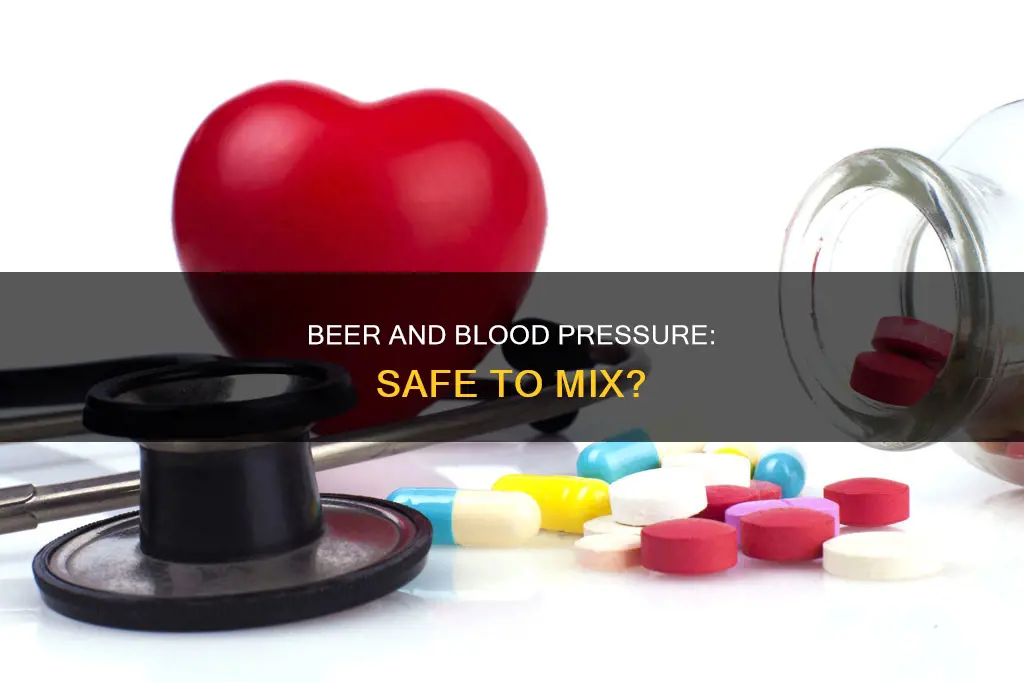
Drinking alcohol while taking blood pressure medication can lead to several adverse side effects. Alcohol can cause high blood pressure and may interfere with how blood pressure medication works. Mixing the two can lead to dizziness, drowsiness, fainting, a fast heart rate, and a dangerous fall or injury. Alcohol may also affect how the body breaks down medication, increasing the effects of the medicine and causing a more significant drop in blood pressure. It is recommended that you consult a medical professional to determine if it is safe for you to consume alcohol while taking blood pressure medication.
| Characteristics | Values |
|---|---|
| Can I drink beer while taking blood pressure medication? | It is not recommended to drink alcohol while taking blood pressure medication. |
| Why? | Alcohol can increase the effects of blood pressure medication, causing blood pressure to drop too low (hypotension). |
| What are the risks? | Dizziness, fainting, drowsiness, falls, heart rhythm problems (arrhythmia), upset stomach, nausea, vomiting, and liver problems. |
| What does the research say? | There is limited research on how alcohol interacts with blood pressure medication, but it suggests that drinking may interfere with how these medications work. |
| What do healthcare providers recommend? | Most healthcare providers recommend avoiding alcohol while taking blood pressure medication. |
| How much alcohol is considered safe? | The American Heart Association recommends no more than two drinks per day for men and one drink per day for women. |
What You'll Learn
- Drinking alcohol with blood pressure medication can cause orthostatic hypotension
- Alcohol may affect how blood pressure medication works
- Drinking alcohol with blood pressure medication can increase the risk of falling
- Drinking alcohol with blood pressure medication can cause drowsiness
- Drinking alcohol with blood pressure medication can cause dizziness

Drinking alcohol with blood pressure medication can cause orthostatic hypotension
Drinking alcohol while taking medication can be dangerous. Alcohol can change how a medication works, and certain drugs can change how you feel the effects of alcohol. Alcohol can make some medications less effective by interfering with how they are absorbed in the digestive tract. In some cases, alcohol increases the bioavailability of a drug, which can raise the concentration of the medication in your blood to toxic levels.
Orthostatic hypotension can lead to a fall, an injury, or a broken bone. It is a serious concern, especially in older patients. Mixing alcohol with a drug that also causes these side effects can worsen them.
Additionally, liver enzymes are often responsible for how medicines are changed in the body before they are excreted. Alcohol can affect these liver enzymes and alter drug levels in your bloodstream. This can make medication side effects worse or lower the effectiveness of your medicine.
If you have liver disease, changes in drug effectiveness or side effects may also occur. Tell your doctor if you have liver disease before you start any medicine for your heart or blood pressure. Alcohol use can worsen liver disease, too.
Understanding Beer Bikes: How Do They Work?
You may want to see also

Alcohol may affect how blood pressure medication works
Additionally, alcohol can cause side effects that may overlap with those of blood pressure medication, including dizziness, drowsiness, and fainting. These side effects can be more intense and severe when combined with alcohol. Drinking alcohol while taking blood pressure medication can also increase the risk of heart rhythm problems (arrhythmia) and severely low blood pressure.
The combination of alcohol and blood pressure medication can also lead to orthostatic hypotension, which is low blood pressure when you stand up from a sitting or lying-down position. This can lead to dizziness, lightheadedness, or fainting. These effects can be more pronounced at the beginning of treatment or when increasing the dosage of blood pressure medication.
Furthermore, alcohol itself can raise blood pressure, especially when consumed in excess. Regular alcohol intake can lead to high blood pressure and make it harder for blood pressure medications to work effectively. Therefore, it is generally recommended to avoid alcohol while taking blood pressure medication.
It is important to consult with a healthcare professional to determine if it is safe to consume alcohol while taking blood pressure medication, as it may depend on individual factors such as medical history, age, and other medications.
Beer and Workout: A Healthy Mix?
You may want to see also

Drinking alcohol with blood pressure medication can increase the risk of falling
Drinking alcohol while taking blood pressure medication can increase the risk of falling. This is because the combination of alcohol and blood pressure medication can cause side effects such as dizziness, drowsiness, and fainting. These side effects are due to the interaction between alcohol and the medication, which can lead to a drop in blood pressure, known as hypotension.
The more alcohol you consume, the greater the risks become. Alcohol may affect each person differently, but the potential for negative side effects is always present when mixing alcohol and blood pressure medication. Even small amounts of alcohol can increase the intensity of side effects typically associated with blood pressure medication, such as dizziness or lightheadedness.
The combination of alcohol and certain types of blood pressure medication, such as alpha-blockers, can be particularly dangerous. Alpha-blockers are used to treat high blood pressure, and when mixed with alcohol, can cause excessively low blood pressure, lightheadedness, drowsiness, and an increased risk of falling.
Additionally, alcohol is metabolized in the liver, which is also responsible for breaking down medication. When you consume alcohol, it can change the way your body metabolizes medication, leading to a slower clearance of the blood pressure medication from your system. This means that your body retains higher levels of the drug for longer, which can lead to stronger effects and a further increased risk of falling.
It is important to note that the risks associated with drinking alcohol while taking blood pressure medication are not limited to falling. Other serious side effects may include heart rhythm problems (arrhythmias), upset stomach, nausea, vomiting, and severely low blood pressure. Therefore, it is generally recommended to avoid alcohol while taking blood pressure medication. If you choose to drink, it is crucial to consult your healthcare provider to understand the potential risks and ensure the safety of alcohol consumption with your specific medication.
Beer and Diatizem: What's the Verdict?
You may want to see also

Drinking alcohol with blood pressure medication can cause drowsiness
Drinking alcohol while taking blood pressure medication can be dangerous. Alcohol can cause drowsiness, dizziness, and fainting, which can lead to dangerous falls or accidents. Mixing alcohol with blood pressure medication can increase these side effects and make them more severe.
When you drink alcohol, it can affect the way your body breaks down the medication. Alcohol is metabolized in the liver, which is also responsible for breaking down many medications. This can lead to a slower clearance of the medication from your system, resulting in higher levels of the drug staying in your body for longer. This increases the effects of the medication and can cause a significant drop in blood pressure, known as hypotension.
The combination of alcohol and blood pressure medication can lead to severely low blood pressure, which can cause dizziness, fainting, and an increased risk of falling. It can also cause drowsiness and severe fatigue. These side effects can impact your daily life and make certain activities, such as driving or operating machinery, hazardous.
Additionally, alcohol itself can raise your blood pressure. Regular alcohol intake can lead to high blood pressure, which can make it harder for your medications to work effectively. Drinking alcohol can also indirectly lead to high blood pressure through weight gain. Therefore, it is generally recommended to avoid alcohol while taking blood pressure medication.
If you are taking blood pressure medication and considering drinking alcohol, it is important to consult your healthcare provider. They can advise you based on your individual medical history, current health condition, and the specific medication you are taking. In some cases, your healthcare provider may advise you to avoid alcohol altogether. It is important to be honest with your provider about your alcohol consumption to ensure your safety and the effectiveness of your treatment.
Beer for Slugs: Does It Work?
You may want to see also

Drinking alcohol with blood pressure medication can cause dizziness
Drinking alcohol while taking blood pressure medication can cause dizziness and other side effects such as drowsiness, lightheadedness, fainting, and a fast heart rate. This is because alcohol can increase the effects of blood pressure medication, leading to a more significant drop in blood pressure, known as hypotension. This can be dangerous, especially for older patients, as it can increase the risk of falls, injuries, and broken bones.
The combination of alcohol and blood pressure medication can also lead to orthostatic hypotension, which is a sudden drop in blood pressure when going from a sitting or lying down position to standing. This can result in dizziness, lightheadedness, or fainting. These side effects may be more common at the beginning of treatment or when increasing the dose of the medication.
Additionally, alcohol is broken down in the liver, which is also responsible for breaking down medications. Drinking alcohol can affect how the liver metabolizes medications, leading to altered drug levels in the bloodstream. This can make medication side effects worse or reduce the effectiveness of the medication.
The risks of drinking alcohol while taking blood pressure medication may vary depending on individual factors such as age, health status, and other medications being taken. It is always best to consult with a healthcare provider to determine if it is safe to consume alcohol while taking blood pressure medication.
To reduce the risk of dizziness and other side effects, it is important to avoid rising quickly from a sitting or lying down position. It is also generally recommended to limit alcohol intake or avoid it altogether when taking blood pressure medication.
Beer and Lidocaine: A Safe Mix?
You may want to see also
Frequently asked questions
It is not recommended to drink beer or any other alcoholic beverage while taking blood pressure medication. Alcohol can increase the effects of blood pressure medication, causing blood pressure to drop too low, which can lead to serious side effects such as dizziness, drowsiness, fainting, and heart rhythm problems (arrhythmia).
Alcohol is metabolized in the liver, which is also responsible for breaking down medication. When you consume alcohol, it can change the way your body metabolizes medication, leading to a higher concentration of the drug in your system and potentially enhancing its effects.
Mixing alcohol with blood pressure medications can lead to several side effects, including dizziness, drowsiness, fainting, heart rhythm problems (arrhythmia), severely low blood pressure, upset stomach, nausea, and vomiting.
The safety of drinking alcohol while on blood pressure medication depends on various factors, including your medical history, age, and other medications you may be taking. It is crucial to consult your healthcare provider to determine if any alcohol consumption is safe for you.
The American Heart Association recommends no more than two drinks per day for men and one drink per day for women. However, even moderate drinking may worsen blood pressure problems, so it is essential to consult your healthcare provider for personalized advice.







